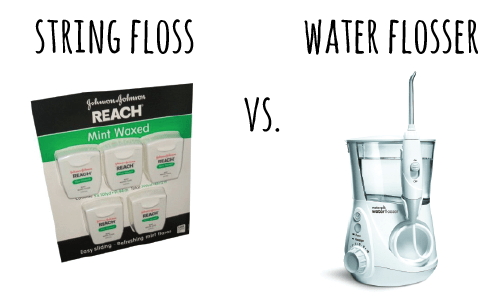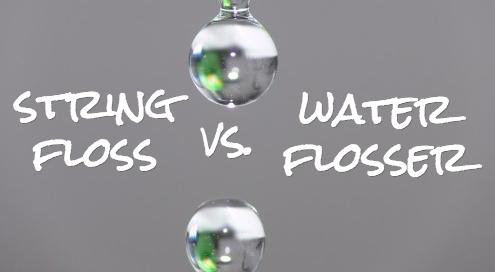Trying to decide between using a water flosser vs string floss? We’ll be highlighting some of the key things to consider when choosing between a water flosser (such as Waterpik) or traditional string floss.

Water Flosser vs String Floss: What to Consider
When choosing between a water flosser or string floss, be sure to think about:
- Price: String floss will be less expensive than purchasing a water flosser. Top water flossers can cost anywhere between $30-$70.
- Ease of Use: String floss is fairly easy to use, but many find a water flosser to be far more convenient. For those who know they won’t use string floss, a water flosser can be a good alternative.
- Electricity: Most water flossers are electric, so they’ll need to be plugged into an outlet in your bathroom. If you already use an electric toothbrush or other electric bathroom devices, having yet another item on your bathroom counter could prove frustrating.
- Quality of Flossing: You’ll also want to consider whether or not a water flosser can provide the same quality of flossing that string floss can. While this issue continues to be disputed, many dentists agree that string floss is better for your teeth than a water flosser (we’ll discuss this more in-depth below)!
Can Water Flossers Replace String Floss?
There is still a fair amount of debate regarding whether or not water flossers, such as Waterpik, can be used to replace flossing. Although opinions vary, most dentists say no, water flossers should not be used to replace manual string flossing.
The reason for this is that, while water flossers shoot a stream of water between your teeth and does a great job of removing food particles and rinsing teeth, the string floss, with its scraping motion, does a superior job at removing plaque.
The scraping motion of the string floss is what removes plaque which, if left on teeth, can eventually become tarter and result in gum disease.
Since there is no scraping motion (as with string floss), plaque cannot be removed. Plaque is rinsed off with a water flosser or an air flosser, which is good, but most dentists agree that scraping off the plaque via string floss is better.
Who Should Use Water Flossers Over String Floss?
While most dentists recommend using string floss, in addition to or in substitution of a water flosser, there are some cases in which individuals will not be able to use string floss.
String floss can be problematic for individuals with:
- Sensitive Gums. People with sensitive gums may find that water flossers are less painful and are more gentle than traditional string floss.
- Braces. Individuals with braces can use waterflossers to get food particles dislodged from their braces.
- Dexterity issues. Those who have trouble positioning their hands properly in their mouths for string floss will find that water flossers are much easier to use.
In these situations when string floss can’t be used, a water flosser is a great alternative.
It’s also true that, despite the fact that string floss does do a superior job of removing plaque, some individuals simply won’t floss because they dislike it so much. If you really are not going to floss, using a water flosser is certainly better than doing nothing.
However, if your refusal to floss is personal preference, make sure to try different types of string floss, as some are much easier to use than others. Try different kinds of floss, such as easy glide ribbon floss, which moves very smoothly between teeth and is less likely to get stuck or jammed between teeth.
String floss advantages over a water flosser includes:
- Scraping motion removes plaque more effectively than water flosser
- Cheaper than a water flosser
Water flosser advantages over string floss
- Very easy and quick to use
- Great for those with dexterity issues, braces, or individuals who truly can’t stand flossing
Ultimately, string floss should be the first choice for those looking to maintain healthy teeth. If string floss is not a viable solution, you may want to consider water flosser.
For more information on how water flossers work and for understanding all the pros and cons, read our post explaining all about water flossers.





Cite your sources, please. This article was mostly helpful, but I would like to know where you got your conclusion on the opinions of “most dentists”, for example. Your information is not trustworthy if you refuse to say where you got it from.
Thank you for the reminder David – while amidst the writing process, it can be easy to forget to link out to sources used! I’ve updated this article accordingly with material to reinforce some of the arguments in this post.
I’ve done a lot of online research into the question of Waterpik versus floss, and what I’ve found overwhelmingly is that dentist websites almost always claim that the Waterpik doesn’t remove plaque as well as floss, but they never cite any conclusive evidence to support this. In contrast, the actual studies I’ve come across which tested this clinically, have all found that not only is the Waterpik slightly better at removing plaque, but it also makes the gums healthier and is better at getting getting bacteria out of pockets than floss (basically floss does nothing in this respect).
So what are we supposed to think? I’ve never found one dentist or oral hygienist who is able to support their view that floss is better than the Waterpik with scientific. So in view of this, I’m going to side with the clinical studies which prove otherwise.
You don’t need to take anyone’s word for anything! There are many “plaque discloser” liquids available (google it) and these can be used to directly test each technique. Do your normal flossing and use the visualizer, then next week do the water pick and use the visualizer. You will be convinced quite clearly!
This is the best answer to all questionings! While statistics show big figures, there are always lots of points out of the curve. To find the best solution for oneself, nothing is better than trying. Very good. Congrats!
Hey Jason – most studies I’ve found that say Waterpiks are better at removing plaque than string floss are paid for by Waterpik or competing products. If you’ve found independent studies, please share them here, we’d all love to see them!
Ultimately, the tool you use is the one that will work best. Many folks hate string floss, which makes water flossers the winners in many cases.
See BD’s comment above. That article was published in a peer reviewed medical journal in 2013. Not sponsored by Waterpik.
https://www.ncbi.nlm.nih.gov/pubmed/24282867
This research found that water flossing is more effective than string flossing (74.4% reduction in plague for WF as compared to 57.7% for SF). It is published in pubmed hence I assume that it is reliable. Any specialist is welcome to take a look and share opinions.
I have no specialty in the subject to discuss further.
Just for clarification, the journal this was published in was the Journal of Clinical Dentistry; one online journal archive the article can be found in is PubMed.